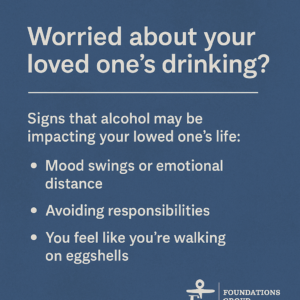When someone you love drinks too much, you feel it long before they ever admit there’s a problem. Maybe the laughter’s dimmed, the trust’s cracked, or the silence at dinner has grown too loud to ignore. You’ve given grace. You’ve rationalized. You’ve waited. But now, something in you is asking: Is it time to say something?
At Foundations Group Recovery Center, we understand the fear, love, and deep uncertainty that spouses and partners face when alcohol becomes a third presence in the relationship. You’re not alone—and you’re not without options. Here’s what we want you to know.
You’re Not Imagining It
It’s one of the hardest truths to accept: the person you love may be struggling more than they let on. They may seem high-functioning. They may say it’s not that bad. They may even believe it. But you’ve noticed changes. And your instincts aren’t wrong.
Signs that alcohol may be impacting your loved one’s life more than they admit:
- Mood swings, irritability, or sudden emotional distance
- Drinking in secret or lying about how much they had
- Avoiding responsibilities or blaming others for their behavior
- Health changes, sleep issues, or unexplained injuries
- You feel like you’re walking on eggshells
If you’ve felt like something is “off” for a while—trust that. You’re not being dramatic. You’re responding to something real.
Loving Them Doesn’t Mean Losing Yourself
It’s natural to want to help. To carry the weight. To fix it with just the right words or sacrifices. But when alcohol addiction is in the picture, love can quietly become overextension. And over time, that leaves you depleted.
Setting boundaries doesn’t mean you’re giving up. It means you’re showing up with clarity. It says: I care deeply. And I need safety too.
Examples of boundary-setting in action:
- “I’m not comfortable being around you when you’ve been drinking.”
- “I love you, but I won’t lie to others to cover up the consequences.”
- “If you miss dinner again because of drinking, I’ll still eat—but I won’t wait.”
Boundaries aren’t ultimatums. They’re signals of self-respect—and sometimes, the wake-up call a partner needs.
When to Speak Up (And What to Say)
There’s no perfect script. But there is a better moment. Ideally, choose a time when your partner is sober, calm, and not in the middle of a crisis. Speak from care, not blame.
Here’s a structure to help guide the conversation:
- Lead with love: “I care about you, and I’m worried.”
- Stick to observable facts: “Last weekend, you missed our plans, and you didn’t remember it the next day.”
- Name the impact: “That hurt me, and I felt really alone.”
- Invite openness: “Can we talk about what’s really going on?”
- Offer support, not control: “If you’re ready, I’d go with you to talk to someone.”
Even if they resist, you’ve planted a seed. And that seed is often what makes help feel more possible down the line.
Understanding Alcohol Addiction Treatment Options in Massachusetts
If your partner is open to help, or if you’re gathering resources to share when the time is right, here’s what to know.
At Foundations Group Recovery Center in Massachusetts, we provide alcohol addiction treatment that meets people where they are—without shame, judgment, or pressure to be perfect. Our services include:
- Day Treatment (PHP): A structured, daily program offering therapy, education, and medical support.
- Intensive Outpatient Program (IOP): Ideal for those balancing work or family life while seeking real change.
- Outpatient Therapy & Support: Individual or group therapy designed to maintain momentum in recovery.
Each plan is tailored to the individual, and we work closely with families to ensure everyone has support—not just the person receiving care.
For details, visit our alcohol addiction treatment in Massachusetts page.
Support Is for You, Too
This is hard. Loving someone through addiction hurts, even if you don’t talk about it much. You deserve support just as much as your loved one does.
Consider these supportive steps for yourself:
- Join a local Al-Anon group or similar family support community
- Speak with a therapist familiar with addiction dynamics
- Learn about codependency, enabling, and emotional fatigue
- Take breaks without guilt—rest is not abandonment
Helping someone else get better doesn’t have to come at the cost of your own well-being.
FAQ: Alcohol Addiction and Family Dynamics
What if my partner says they don’t have a problem?
Denial is common. Instead of arguing, focus on how you feel. “I feel scared when you drive after drinking” is harder to dismiss than “You’re an alcoholic.”
Can I force them into treatment?
In most cases, adults must choose treatment willingly. But your boundaries—and your willingness to step back—can be a powerful motivator.
Will our relationship survive this?
It’s possible. Many couples do recover stronger. But healing requires honesty, safety, and support on both sides. Therapy can help navigate that path.
Do you offer support for spouses too?
Yes. At Foundations, we believe recovery is a family process. We offer education, guidance, and resources tailored for loved ones as part of our care model.
Is it okay to still love them?
Absolutely. Love isn’t the problem. But love that loses itself isn’t sustainable. You can care deeply and choose safety—for both of you.
Ready to Take the Next Step?
No one hands you a manual on how to love someone through addiction. But you don’t have to figure it all out alone. If you’re ready to talk—whether it’s about your partner’s drinking or just needing a place to start—we’re here.
📞 Call Foundations Group Recovery Center at (844) 763-4966. Let’s talk about what support can look like—for both of you.


